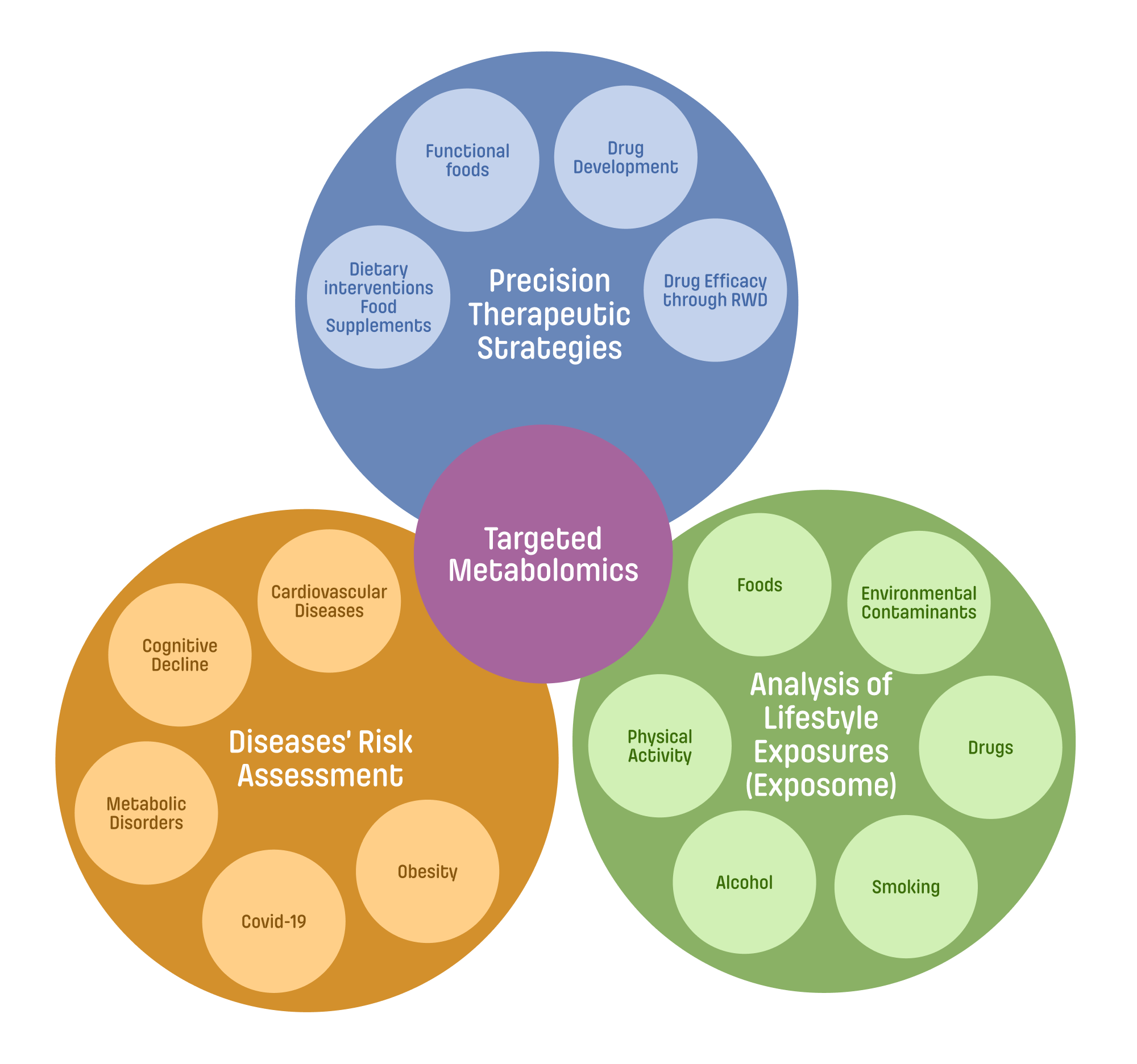Applications
Thanks to the methodology developed by our group and our alliance with the Metabolomics Innovation Centre (TMIC) in Canada, we can simultaneously characterize the endogenous metabolome, food-related metabolites, pharmaceuticals, household chemicals, environmental contaminants, and microbiota-derived compounds, with a total of over 2,000 metabolites.
Applications in various research areas, therapeutic development an clinical fields
The broad application of targeted metabolomics makes this methodology a promising tool not only in biomarker discovery but also in the etiological research of diseases. For example, metabolomics has been one of the most popular and powerful tools for the diagnosis and prognosis of type 2 diabetes.

Application of Targeted Metabolomics
-

Cancer
Metabolomics is a valuable tool for identifying predictive, diagnostic, or prognostic biomarkers, risk assessment biomarkers, as well as for investigating treatment resistance or response and discovering new therapeutic targets (doi: 10.1016/j.tranon.2024.102196)
-

Cardiovascular
Diabetes, hypertension, obesity, genetics, environmental factors, immunity, inflammation, and oxidative stress are risk factors associated with cardiovascular disease.
-

Diabetis
Recent evidence shows that metabolomic profiles are related to the incidence of diabetes. Metabolites such as 1,5-anhydroglucitol, branched-chain amino acids, glucose, α-hydroxybutyric acid, 3-hydroxyundecanoyl-carnitine, and phosphatidylcholine can be used to develop personalized prognostics and diagnostics, contributing to better diabetes management.
-

Cognitive Health
By studying the effects of metabolites present in food and how they influence our microbiome, we can better understand how diet impacts cognitive health, the prevention of neurological diseases, and overall brain well-being.
-

Inflammation
-

Nutrition
Nutrimetabolomics can accelerate our ability to identify nutrient-influenced metabolic diseases and develop targeted diet-based treatments.
Our methodology adapts to the type of research you are conducting.

-
Intervention Studies: Supporting advancements in drug development, nutraceuticals, food innovation, and dietary intervention research to address specific health challenges.
-
Epidemiological Research: Providing insights through studies on diverse cohorts to identify population patterns, risk factors, and associations between exposures and health outcomes.
-
Evaluation of Treatment Efficacy: Utilizing real-world data (RWD) collection to assess and refine treatment effectiveness, ensuring a more personalized and evidence-based approach to healthcare.
-
Precision Medicine and Nutrition: Enabling personalized health strategies by identifying metabolic and exposome-related biomarkers, paving the way for prevention, diagnosis, and targeted treatments that consider individual variability.
Capacities for your research
Contact-

Food Metabolome
A detailed characterization of the food metabolome enables precise monitoring of dietary exposure and the identification of foods that influence the risk of developing diseases.
-

Clinical and Lifestyle Biomarkers
We analyze an advanced set of clinical biomarkers for monitoring and personalizing targeted treatments in nutrition and health.
-

Environmental Pollution Biomarkers
Environmental epidemiology allows us to link the development of certain diseases to exposure to pollutants, which can be measured using specific environmental pollution biomarkers.
-

Microbiota Activity
The microbiota has a significant impact on both metabolic and brain health. We quantify microbiota-derived metabolites to determine their effect on the host’s overall health.
-

Dietary Assessment
The effect of dietary changes on phenotypes is known to vary significantly between individuals. Therefore, it is essential to assess dietary intake using approaches beyond traditional tools.
-

Dietary Recommendations
Thanks to the analysis and quantification of metabolites, we can provide dietary recommendations for personalized nutrition.
How can we help you?
Department of Nutrition, Food Science, and Gastronomy
Faculty of Pharmacy and Food Sciences, INSA-UB
University of Barcelona
Diagonal Campus
Avda. Joan XXIII, 27-31, Building B
08028 – Barcelona















